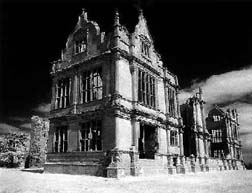"Rappaccini's Daughter"


Nathaniel Hawthorne, nineteenth-century American novelist, was born in Salem, Massachusetts on July 4, 1804. He is considered one of America's greatest fiction writers (Short Story 152). He is most acclaimed for his novel The Scarlet Letter, which is considered a piece of classic American literature. Hawthorne's New England Puritan background is plainly evident and permeates his novels and short stories. Many of Hawthorne's stories incorporate use of action and image to create a complex narrative through use of symbols and allusions (Short Story 153). Such is the case in "Rappaccini's Daughter" where Biblical allusions are made to the story of Adam and Eve through the relationship of two lovers in a poisonous garden. Also the themes of science and the responsibility of scientists are prominent throughout his work and his fears of scientific endeavor are especially present in "The Birthmark" and "Rappaccini's Daughter" (Short Story 152). Hawthorne married Sophia Peabody in 1842 and move into a large house in Concord where he wrote a collection of stories titled Mosses from an Old Manse (Short Story 152). The collection contains Hawthorne's best short story "Rappaccini's Daughter."

"Rappacini's Daughter", first published in 1844 is regarded bycritics as Hawthorne's greatest and most difficult piece of work tounderstand. The protagonist, Giovanni Guasconti, is a student who has come to Padua, Italy to study at the university. His window room overlooks a garden cultivated by Dr. Giacomo Rappaccini and his daughter Beatrice. He notices many strange and disturbing things about the actions of the Rappaccinis: the strange demeanor of Dr. Rappaccini in the garden, Beatrice's carefree loving embraces of the plants, and the unusual death of flies and withering of flowers. These brings fears to Giovanni and he is warned by his father's old friend Professor Baglioni to steer clear of the Rappaccinis. Giovanni however falls deeply in love with Beatrice and begins to spend many hours with her in the garden. Again Baglioni warns Giovanni that he might be the subject of a mad science experiment involving Beatrice and himself. Baglioni tells Giovanni that Beatrice has been feed poisonous flowers her whole life and has breath of poison. He gives Giovanni a vile of serum that will cleanse the vilest of poison. Giovanni realizes the situation he is in and gives the serum to Beatrice in hopes that it will cure the poison that has taken over her body. The serum however kills her and the story ends with the declaration of Baglioni, "Rappaccini! Rappaccini! and this is the upshot of your experiment!"
Many critics agree that Dr. Rappaccini's garden is parable to a poisoned garden of Eden (Masterplots) The garden resembles the world in that the evil of man plagues us. Dr. Rappaccini represents man's unstoppable quest for knowledge. Destroying everything in their way to get the answers. Dr. Rappaccini uses people for his experiments, not caring about the damage he does. His position over these people makes him godlike. God's experiment was the creation of the human race; Rappaccini's experiment is his poison garden.
The internal struggle of emotions that Giovanni has about the beautiful yet poisonous Beatrice is an evidence of his inability to distinguish the outside flesh from the inner soul. Giovanni is a shallow character whose motives are purely sexual in his relationship with Beatrice (Short Story 173). When Giovanni discovers that he possesses the poison of the body that Beatrice has he immediately becomes enraged. But when he goes down to see her is anger subsides slightly at the sight of her beauty. Later though, he has an outburst of emotion calling the women he loves, "Accursed one!" and "poisonous thing!". This shows the quality of love that Giovanni possesses is of a physical nature, consumed with outward appearance. Beatrice disgusts him because she is of a vile outward nature, although not of her own choice, and has also he believes made him poisonous too. Beatrice tries to explain that "though [her] body be nourished with poison, [her] spirit is God's creature. Giovanni has no understanding of the beauty of the soul of Beatrice for he is not able to understand on that level or to feel on that elevated level. Giovanni offers the vial of antidote that is supposed to cure the most evil of poisons and she takes it. Before she drinks it she adds "with peculiar emphasis, 'I will drink; but do thou await the result.'" Beatrice knows that antidote will kill because poison was her nourishment therefore pure substances are harmful to her. She drinks anyway knowing that her and Giovanni could never have "earthly happiness" together. Her last words to Giovanni ring true of the nature of Giovanni: "Oh, was there not from the first, more poison in thy nature than in mine?"
"back home" Click to view"Rappaccini's Doughter"